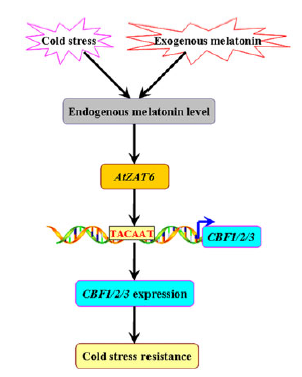
Investigation Reveals Melatonin-mediated Signal Transduction in Plant
Jul 01, 2014 Email"> PrintText Size

Melatonin (N-acetyl-5-methoxytryptamine), produced in the pineal gland which is outside of the blood–brain barrier, acts as an endocrine hormone since it is released into the blood. Melatonin has been studied as a potential treatment of gastroesophageal reflux disease, cancer, immune disorders, cardiovascular diseases, depression, seasonal affective disorder (SAD), circadian rhythm sleep disorders, sexual dysfunction and insomnia in the elderly. Prolonged release melatonin has shown good results in treating insomnia in older adults. It may improve circadian misalignment and SAD. Basic research indicates that melatonin may play a role in modulating the effects of drugs of abuse such as cocaine. Melatonin is also a geroprotector.
Melatonin is not only a widely known animal hormone, but also an important regulator in plant development and multiple abiotic stress responses. Recently, it has been revealed that melatonin alleviated cold stress through mediating several cold-related genes and three transcription factors. However, the endogenous melatonin concentration in response to cold stress in was largely unknown, and molecular mechanism of melatonin-mediated plant cold stress responses remains unclear.
Dr. SHI Haitao, led by Prof. CHAN Zhulong from Wuhan Botanical Garden
Interestingly, exogenous melatonin enhanced freezing stress resistance was largely alleviated in AtZAT6 knockdown plants, but was enhanced in AtZAT6 overexpressing plants. Moreover, the expression levels of AtZAT6 and AtCBFs were commonly up-regulated by cold stress (4°C) and exogenous melatonin treatments, and modulation of AtZAT6 expression significantly affected the induction AtCBFs transcripts by cold stress (4°C) and exogenous melatonin treatments.
Taken together, the results indicated that AtZAT6-activated CBF pathway was essential for melatonin-mediated freezing stress response in Arabidopsis.
Relevant results were published in Journal of Pineal Research (doi: 10.1111/jpi.12155, IF=7.304) entitled “The Cysteine2/Histidine2-type transcription factor ZINC FINGER OF ARABIDOPSIS THALIANA 6-activated C-REPEAT-BINDING FACTOR pathway is essential for melatonin-mediated freezing stress resistance in Arabidopsis”.
This research was supported by the National Natural Science Foundation of China, the “Hundred Talent Program”, and the Knowledge Innovative Key Program of Chinese Academy of Sciences to CHAN Zhulong, and by the National Natural Science Foundation of China, Youth Innovation Promotion Association of Chinese Academy of Sciences, the Knowledge Innovative Key Program of Chinese Academy of Sciences, and the Outstanding Young Talent Program of Key Laboratory of Plant Germplasm Enhancement and Specialty Agriculture to SHI Haitao.

Model depicting the mechanism of AtZAT6 in melatonin-mediated freezing stress response in Arabidopsis. (Image by SHI Haitao)
Melatonin (N-acetyl-5-methoxytryptamine), produced in the pineal gland which is outside of the blood–brain barrier, acts as an endocrine hormone since it is released into the blood. Melatonin has been studied as a potential treatment of gastroesophageal reflux disease, cancer, immune disorders, cardiovascular diseases, depression, seasonal affective disorder (SAD), circadian rhythm sleep disorders, sexual dysfunction and insomnia in the elderly. Prolonged release melatonin has shown good results in treating insomnia in older adults. It may improve circadian misalignment and SAD. Basic research indicates that melatonin may play a role in modulating the effects of drugs of abuse such as cocaine. Melatonin is also a geroprotector.
Melatonin is not only a widely known animal hormone, but also an important regulator in plant development and multiple abiotic stress responses. Recently, it has been revealed that melatonin alleviated cold stress through mediating several cold-related genes and three transcription factors. However, the endogenous melatonin concentration in response to cold stress in was largely unknown, and molecular mechanism of melatonin-mediated plant cold stress responses remains unclear.
Dr. SHI Haitao, led by Prof. CHAN Zhulong from
Interestingly, exogenous melatonin enhanced freezing stress resistance was largely alleviated in AtZAT6 knockdown plants, but was enhanced in AtZAT6 overexpressing plants. Moreover, the expression levels of AtZAT6 and AtCBFs were commonly up-regulated by cold stress (4°C) and exogenous melatonin treatments, and modulation of AtZAT6 expression significantly affected the induction AtCBFs transcripts by cold stress (4°C) and exogenous melatonin treatments.
Taken together, the results indicated that AtZAT6-activated CBF pathway was essential for melatonin-mediated freezing stress response in Arabidopsis.
Relevant results were published in Journal of Pineal Research (doi: 10.1111/jpi.12155, IF=7.304) entitled “The Cysteine2/Histidine2-type transcription factor ZINC FINGER OF ARABIDOPSIS THALIANA 6-activated C-REPEAT-BINDING FACTOR pathway is essential for melatonin-mediated freezing stress resistance in Arabidopsis”.
This research was supported by the National Natural Science Foundation of China, the “Hundred Talent Program”, and the Knowledge Innovative Key Program of Chinese Academy of Sciences to CHAN Zhulong, and by the National Natural Science Foundation of China, Youth Innovation Promotion Association of Chinese Academy of Sciences, the Knowledge Innovative Key Program of Chinese Academy of Sciences, and the Outstanding Young Talent Program of Key Laboratory of Plant Germplasm Enhancement and Specialty Agriculture to SHI Haitao.

Model depicting the mechanism of AtZAT6 in melatonin-mediated freezing stress response in Arabidopsis. (Image by SHI Haitao)
CAS Institutes
There are 124 Institutions directly under the CAS by the end of 2012, with 104 research institutes, five universities & supporting organizations, 12 management organizations that consist of the headquarters and branches, and three other units. Moreover, there are 25 legal entities affiliated and 22 CAS invested holding enterprisesThere are 124 I...>> more
Contact Us

Chinese Academy of Sciences
Add: 52 Sanlihe Rd., Xicheng District, Beijing, China
Postcode: 100864
Tel: 86-10-68597592 (day) 86-10-68597289 (night)
Fax: 86-10-68511095 (day) 86-10-68512458 (night)
E-mail: cas_en@cas.cn

